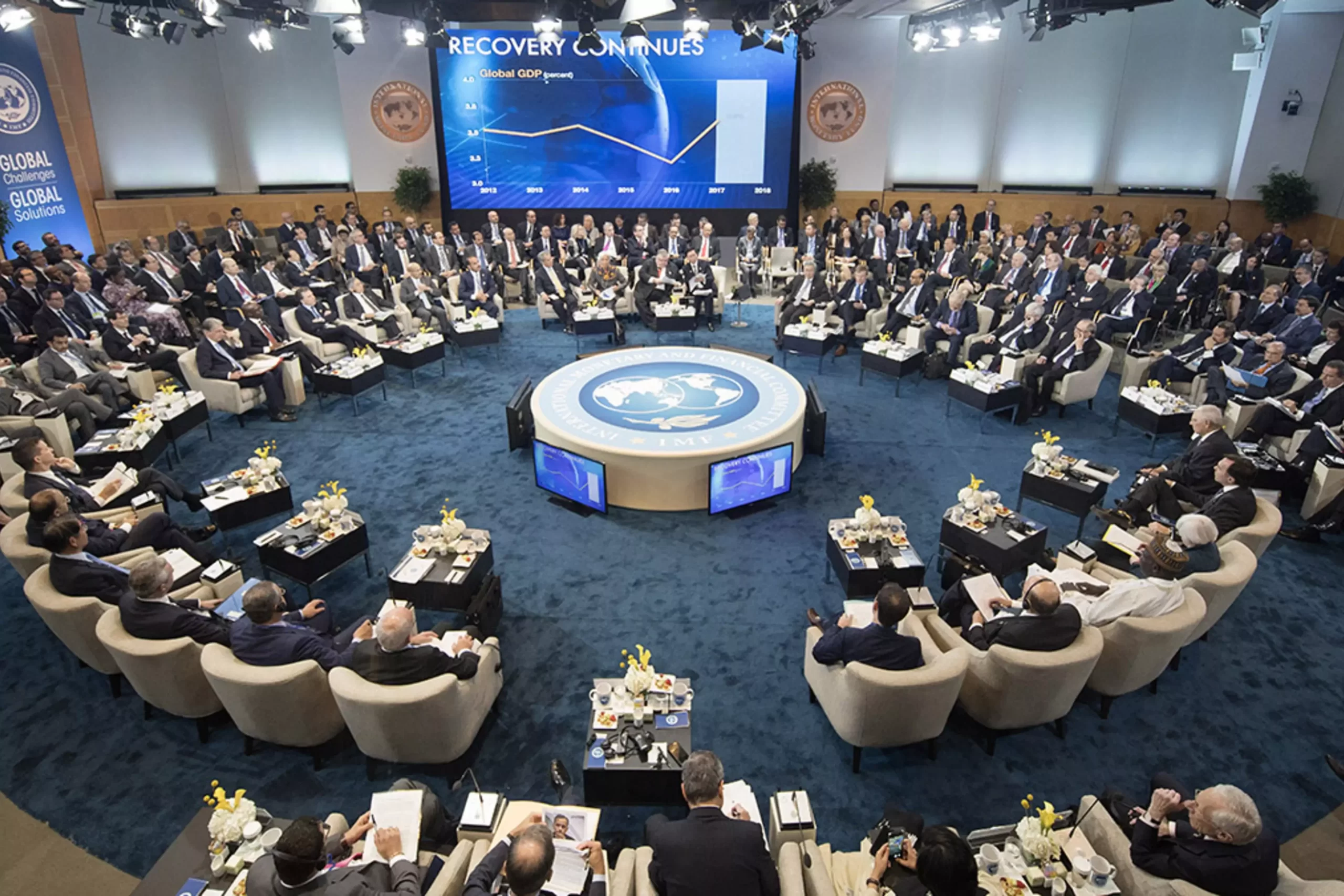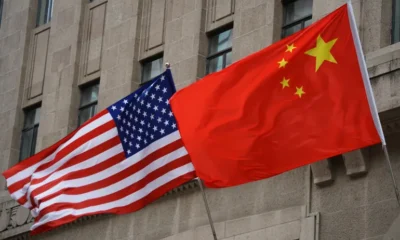NEWS
IMF Cautions Sub-Saharan Africa on ties with China

The International Monetary Fund (IMF) has issued a warning to Nigeria and other Sub-Saharan African countries about the potential risks associated with their close economic relationships with China.
This alert was featured in the latest IMF Regional Economic Outlook on Sub-Saharan Africa. It comes at a time when Nigeria’s debt to China has surged, reaching $4.73 billion as of June 30, 2023.
According to data from Nigeria’s Debt Management Office (DMO), the country’s debt to China increased by $800 million within one year, rising from $3.93 billion as of June 30, 2022, to $4.73 billion as of June 30, 2023.
These debts primarily involve concessionary loans obtained by the Nigerian government to finance a wide range of infrastructure projects, such as power generation, railways, water supply, airport terminals, agricultural processing, and communication.
Notable projects funded by Chinese loans include the Nigerian National Public Security Communication System project, the Wu-Kaduna section of the railway modernization project, the Abuja light rail project, Nigerian Information and Communication Technology infrastructure backbone project, expansion of airport terminals in Abuja, Lagos, Kano, and Rivers, the Zungeru hydroelectric power project, 40 parboiled rice processing plants project, the Lagos–Ibadan section of the railway modernization project, and rehabilitation/upgrading of the Abuja-Keffi-Markurdi road project.
The historical connection between Nigeria and China can be traced back to a $200 million loan in 2006, which was used to finance the Nigerian Communications Satellite project.
Notably, this loan has been settled by the Nigerian government, including an additional payment of $40.02 million in interest.
China has become a significant economic partner for Nigeria, with bilateral trade between the two countries increasing by nearly 142 percent from 2016 to 2021, according to Cui Jianchun, the Chinese Ambassador to Nigeria.
In the first ten months of 2022, the bilateral trade volume reached $20.04 billion. Nigeria currently stands as China’s third-largest trading partner in Africa, and China is Nigeria’s largest source of imports.
However, the IMF’s latest Regional Economic Outlook, released in October 2023, has raised concerns about the economic vulnerabilities faced by Nigeria and other Sub-Saharan African nations due to their deep economic ties with China.
The IMF’s “Analytical Notes” on this outlook, titled “At a Crossroads: Sub-Saharan Africa’s Economic Relations with China,” acknowledges the beneficial economic ties established with China over the past two decades but warns of potential dangers.
The IMF points out that the recent economic slowdown in China could have adverse effects on Sub-Saharan African trading partners, including Nigeria.
It notes that China has reduced its financing activities in the region amid its growth slowdown and reduced risk appetite.
The anticipated deceleration in China’s growth is expected to negatively impact African trading partners in the medium term, primarily through reduced trade.
The IMF also highlights that infrastructural projects in Sub-Saharan African countries could be affected if China pulls back from its commitments due to the economic slowdown.
Currently, China is a significant source of funding for infrastructure projects across African nations.
Chinese loans, mainly directed at financing public infrastructure projects, have seen a rapid increase in the region since the late 2000s.
As a result, China’s share of total sub-Saharan African external public debt has risen from less than 2 percent before 2005 to about 17 percent in 2021. China has become the largest bilateral official lender to countries in the region.
According to the IMF, Angola, Kenya, Zambia, Cameroon, and Nigeria collectively account for 55 percent of official Sub-Saharan African debt owed to China.
The organization also highlights a correlation between the prevalence of bilateral trade and lending disbursement between China and Sub-Saharan African countries.
This implies that African nations engaging in higher volumes of trade with China tend to receive more loans from the Chinese government.
Furthermore, the IMF notes that China’s Foreign Direct Investment (FDI) to Sub-Saharan Africa has increased significantly since 2006, accounting for about 23 percent of annual FDI inflows (approximately $3 billion) to the region in 2021.
Despite these economic ties, warning signs surfaced during the 2021 China-Africa Cooperation Forum when China announced a reduction in financial support to Africa from $60 billion to $40 billion over three years.
This shift away from direct infrastructure financing was influenced by the increased debt vulnerabilities of many African countries.
The IMF also highlights concerns related to Chinese lending to Sub-Saharan African countries, including imposing relatively harsh terms on debtors and using natural resources as collateral.
The lack of standardization and transparency in public debt due to a lack of systematic documentation by Chinese lenders also raises concerns.
It’s worth noting that the Nigerian government has emphasized the lenient terms of loans obtained from China.
However, concerns were raised in 2020 about a controversial ‘waiving sovereignty’ clause in a commercial loan agreement between Nigeria and the Export-Import Bank of China, which appeared to cede part of Nigeria’s sovereignty to China.
The Nigerian government clarified that the clause did not transfer sovereignty but allowed China to take over Nigerian assets for loan recovery when necessary.
The IMF report points out that about 40 percent of Sub-Saharan African countries facing debt distress or high risk of debt distress are associated with China, prompting the need for debt restructuring in these countries. However, debt restructuring negotiations for some of these countries have been slow and challenging.
As China’s economic growth is currently declining, the IMF warns that Sub-Saharan Africa may experience spillovers from this slowdown.
China’s average annual growth is projected to be around 4 percent in the next five years, which could negatively impact economic activity in Sub-Saharan Africa through reduced trade, particularly in export volumes and commodity prices.
To mitigate potential risks, the IMF advises Sub-Saharan African nations to adapt to evolving economic ties.
They should focus on increasing regional trade integration, strengthening policy frameworks to reduce economic vulnerabilities and external reliance, promoting economic diversification, and implementing reforms to create favorable business environments.
While the IMF’s warning highlights potential vulnerabilities in Sub-Saharan African countries’ economic ties with China, some economists and financial analysts in Nigeria argue that the country is not at significant risk.
Muda Yusuf, CEO of the Centre for the Promotion of Private Enterprise, and Ayo Teriba, CEO of Economic Associates, emphasize that Nigeria’s primary concerns should be its rising debt levels and internal economic issues rather than China’s economic outlook.
Yusuf and Teriba assert that China’s economic challenges are not a grave concern for Nigeria and that the country should prioritize addressing its domestic economic issues.
They also question the stability of IMF forecasts and argue that Nigeria faces real challenges that require immediate attention, such as foreign exchange, fiscal matters, and liquidity concerns.



























